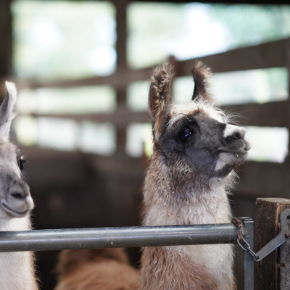
Newborn Cria Care
April 11, 2022
Summer is an exciting time for new arrivals! Whilst most camelids manage this period without any problems, by keeping a close eye on newborns, any problems can be spotted and treated early ensuring happy, healthy babies.
Vaccination
Most herds will booster vaccinate pregnant females in the run up to unpacking (between 2 and 8 weeks prior). This aims to boost the level of antibodies in the colostrum conferring protection to the cria. Crias can then be vaccinated around 3 months old with a full primary course.
Newborn care
Newborn crias should be standing within the first 30-60 minutes and nursing within 2-4 hours. Mum should also pass her placenta within 2-4 hours of birth. Navels should be dipped in iodine tincture to help to dry it and to reduce the risk of infection via this route. If crias aren’t nursing within this time frame then they may need help to suckle or try to milk the mum (we appreciate this isn’t very easy!) and feed this to the cria by bottle. Any cria that is struggling should be checked carefully for potential problems such as a cleft palate. Hernias are also quite common so check the umbilical region carefully. Monitor crias to ensure they pass their first poo within 24-36 hours.
Failure of passive transfer (FPT)
Crias are born with no antibodies, making them extremely susceptible to infection. Young camelids get the important antibodies from the colostrum of their dam so ensuring they get their first drink is really important to protect them from infections. Crias should consume 10-20% of their body weight in the first 24 hours of life (equating to 700-1400ml for a 7kg cria).
Crias can fail to absorb antibodies for a variety of reasons but certain situations put them at higher risk. If any of the situations on the list below apply, then we recommend checking your new arrival for failure to absorb enough antibodies, called Failure of Passive Transfer (FPT).
- Low birth weight (<6KG in alpacas and <7kg in llamas )
- Evidence of prematurity (curled ears, unerupted incisors, socks on feet)
- Difficult birthing or caesarean
- Congenital defects (e.g. cleft palate)
- Maternal issues (first time mum, no bond between mum and baby, no milk, mastitis)
Crias should be weighed daily during the first few weeks of life to and crias that aren’t thriving or aren’t putting on weight should also be assessed. They should generally gain 0.1-0.45kg daily.
Crias with FPT are at risk of life threatening infections so it’s important we check early enough that we can correct the problem before this happens. We recommend checking when the cria is around 24-48 hrs old. The check is a quick and easy blood test that can be performed at the surgery. Crias who are shown not to have enough antibodies can then receive a plasma transfusion to boost antibody levels before infections can set in. If your herd does not currently have any plasma available then do let us know and register your interest for our next Blood Drive Day (2023)
Feeding crias
If mum doesn’t have enough milk then supplementation with other products will be needed. In the first 24 hours, colostrum is vitally important. If camelid colostrum can’t be sourced (this may be unlikely!) then goat’s colostrum is the closest alternative, followed by cow colostrum. If sourcing colostrum from a farm, do be aware of the risks of TB, Johne’s and BVD and only source from herds free of these diseases. Powdered colostrum supplements are available but they generally contain very few antibodies in comparison to camelid colostrum so crias who receive these are at much higher risk of FPT. The product with the highest amount of antibodies is called Immucol Platinum and can be sourced via the Camelid Veterinary Services online shop.
If bottle feeding, aim to feed 10-15% of bodyweight over 24 hours split into 2 hourly feeds initially. Crias feed little and often so this aims to replicate this behaviour. Overfeeding can result in milk entering the wrong stomach and can lead to problems. After 24 hours, milk can be used for feeding as crias are no longer able to absorb colostrum, goat’s milk is the closest alternative to camelid milk.
